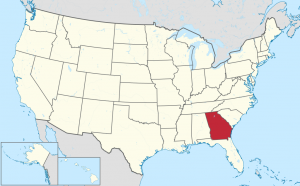 Even though Georgia is known for its delicious peaches, the policies and incentives surrounding solar power are not as ideal for homeowners as in 2008. Several incidents occurred along the way that have led to the current solar energy policies in Georgia.
Even though Georgia is known for its delicious peaches, the policies and incentives surrounding solar power are not as ideal for homeowners as in 2008. Several incidents occurred along the way that have led to the current solar energy policies in Georgia.
Contents
- 1 Key Takeaways
- 2 Introduction
- 3 What Is An RPS?
- 4 Does Georgia Have A Solar Carve-Out?
- 5 Interconnection Rules
- 6 Solar Tax Credits
- 7 Solar Power Rebates
- 8 Case Study: Residential Solar Panel Installation in Georgia
- 9 Expert Insights From Our Solar Panel Installers About Solar Panel Laws in Georgia
- 10 Experience Solar Excellence with Us!
Key Takeaways
- Georgia’s solar energy policies lack incentives and regulations compared to other states, with no strong Renewable Portfolio Standard (RPS) or solar carve-out requirements.
- The state no longer offers significant solar tax credits, relying mainly on the Federal Solar Tax Credit as an incentive for homeowners.
- Georgia’s interconnection and net metering laws do not provide strong customer protections, potentially leading to additional costs for residential solar system owners.
Introduction
The state legislature passed a very strong tax credit for solar power, but that tax credit has since died. Then, in 2015, the legislators passed an act known as the Solar Power Free-Market Financing Act of 2015. This act opened the state up to power-purchase agreements and solar leasing.
It was the beginning of affordable solar power to residential customers across the state. However, as of this current writing, no companies in Georgia are selling solar PPAs.
Georgia is one of the few states in the country that does not have as many solar policies in place as other states. This includes a strong RPS (Renewable Portfolio Standard), strong net metering, interconnection laws, and tax exemptions for renewable energy.
All these policies have been implemented in other states to protect consumers.
In addition, the state’s decision to end solar installation tax credits has resulted in many homeowners deciding to forgo installing solar panels in Georgia, especially since they are not receiving any statewide incentives.
What Is An RPS?
A Renewable Portfolio Standard, or an RPS, is a law that allows the state legislature to mandate a certain percentage of energy generation is produced from renewable sources by a specific date.
The utilities that do business in that state must meet the requirements of renewable energy generation or purchase it from their customers. These companies will be subject to fees and penalties if they do not meet these standards. This means that utilities in states with a strong RPS benefit from these requirements because it is a more affordable option than paying penalties and fees.
As mentioned above, Georgia is one of the few states that has not yet passed an RPS. Even though the state may offer residential customers an occasional incentive based on utility-specific performance or a tax credit, the state does not have a cohesive policy that encourages renewable energy.
Does Georgia Have A Solar Carve-Out?
States with a supplement for solar carve-outs within their RPS require that utilities generate some of their power from the sun. Failure to do so results in penalties for non-compliance.
Once again, Georgia does not have an RPS and, therefore, does not have a solar carve-out.
Interconnection Rules
Interconnection policies determine how solar power system owners can ‘plugin’ and send solar energy to utility companies via the electrical grid. The simpler, more updated, and more straightforward the interconnection rules are, the better the score.
The states with the best interconnection policies allow for any system capacity to offer a less complex process for smaller systems. These policies also ban utilities from mandating unnecessary disconnect switches and have clear, concise dispute resolution rules.
Georgia currently has no regulations that prevent utilities from mandating separate liability insurance or external disconnect switches. Both can cost residential customers more money.
The interconnection and net metering laws in place do not contain any protections or safe harbor policies that can protect customers if they incur unexpected bills and fees from their utility companies.
In addition to net metering and high electricity bills, the only other factor that has been one of the most important for households considering solar power is solar incentives.
Previously, the state did not have great solar panel laws but offered excellent incentives that helped reduce the up-front investment required when transitioning to solar energy. Some of these incentives were so large that many homeowners could save a lot of money without needing an RPS or net metering.
These days, the most significant incentive most residential customers in Georgia will receive is the Federal Solar Tax Credit. This tax credit allows homeowners to earn 30% of the total cost of their solar panel system back in 12 months.

Solar Tax Credits
So, how do these tax credits work? Tax credits offered by the state are not considered to be free money. However, they are considered credits and are not considered deductions.
Georgia no longer offers state tax credits for solar panels, although the state once had excellent solar tax credits for those who wanted to switch to solar power.
The program offered a tax credit that equaled up to 35% of the system’s installation cost, with a maximum credit of $10,500. The program eventually ran out of funding, and the only tax credit Georgia homeowners can receive now is the Federal Solar Tax Credit.
Solar Power Rebates
The rebates for solar power are very similar to the rebates one would get when they purchase an appliance. They are generally distributed by utility companies trying to avoid paying fees due to insufficient renewable energy per the RPS.
It is usually less expensive for utility companies to help residential customers move to solar than paying fines and penalties. Some rebates can help reduce the upfront costs of switching to solar. Other rebates can be distributed in a lump sum after installation.
Georgia’s solar panel laws are lacking in several areas, such as a strong RPS and state tax credits. However, as legislation continues to be drafted and amended, the state can take its rightful position with the best solar energy and solar panel laws.
Case Study: Residential Solar Panel Installation in Georgia
Background
At Solar Panels Network USA, we recently completed a residential solar panel installation project in Atlanta, Georgia. The homeowner was motivated by the rising energy costs and the desire to contribute to environmental sustainability. Despite Georgia’s limited state-level incentives for solar energy, the homeowner was keen to utilize the Federal Solar Tax Credit to make the investment more affordable.
Project Overview
The primary objective of this project was to design and install a solar energy system that would significantly reduce the homeowner’s reliance on traditional energy sources, lower their electricity bills, and leverage the available federal incentives. Given the lack of state incentives, the project had to be meticulously planned to maximize efficiency and cost-effectiveness.
Implementation
The project began with a comprehensive site assessment to determine the optimal placement and configuration of the solar panels. Advanced modeling tools were used to ensure maximum solar exposure and energy production.
Key steps included:
- Initial Consultation and Planning: We conducted detailed discussions with the homeowner to understand their energy consumption patterns and explain the benefits of the Federal Solar Tax Credit.
- Site Assessment and Design: Our team used state-of-the-art technology to map out the roof space, optimizing the placement of solar panels for maximum sunlight exposure.
- Installation: The installation process was carried out by our experienced technicians, ensuring all components were integrated seamlessly with the existing electrical infrastructure. The system was designed to be scalable, allowing for future expansions if needed.
- System Integration: The solar panels were connected to the grid under Georgia’s interconnection rules, despite their limitations. We ensured compliance with all local regulations and optimized the system for efficiency.
Results
The installation resulted in significant energy savings for the homeowner and a reduction in their carbon footprint. The performance of the system exceeded initial projections, providing both environmental and financial benefits.
- Energy Savings: The homeowner experienced a reduction of approximately 60% in their monthly energy costs.
- Environmental Impact: The solar panel system significantly decreased the household’s carbon emissions, aligning with the homeowner’s sustainability goals.
- Financial Benefits: By utilizing the Federal Solar Tax Credit, the homeowner saved 30% on the total installation costs, which translated into substantial financial savings. This incentive was crucial in making the project financially viable given the lack of state-level incentives.
Summary
This case study illustrates how Solar Panels Network USA successfully navigated Georgia’s challenging solar energy landscape to deliver a cost-effective and environmentally friendly solution. By leveraging federal incentives and applying expert knowledge, we provided the homeowner with a sustainable energy system that meets their needs. Our commitment to quality and sustainability ensures that we continue to support homeowners in Georgia and beyond, helping them achieve their renewable energy goals.
Expert Insights From Our Solar Panel Installers About Solar Panel Laws in Georgia
Georgia’s lack of a strong Renewable Portfolio Standard means fewer incentives for homeowners to switch to solar energy. This makes the Federal Solar Tax Credit even more critical for those considering solar installations.
Senior Solar Installer
The Solar Power Free-Market Financing Act of 2015 was a significant step forward, but without active power-purchase agreements in the state, many potential solar customers still face challenges.
Lead Solar Technician
Despite the absence of state tax credits, the Federal Solar Tax Credit provides substantial savings, making solar installations more affordable for Georgia homeowners looking to reduce their energy costs.
Chief Installation Engineer
Experience Solar Excellence with Us!
Trust in Solar Panels Network USA, where our seasoned experts deliver top-quality solar solutions for homes and businesses nationwide. With a legacy of countless successful installations and a commitment to sustainable energy, we’re your reliable partner in the solar journey. Ready for a brighter, eco-friendly future? Call us now at (855) 427-0058 and harness the power of the sun!
Map image by Wikimedia Commons User: TUBS / CC-BY-SA-3.0
About the Author
Solar Panels Network USA stands at the forefront of solar energy solutions, driven by a team of seasoned solar engineers and energy consultants. With over decades of experience in delivering high-quality solar installations and maintenance, we are committed to promoting sustainable energy through customer-centric, tailored solutions. Our articles reflect this commitment, crafted collaboratively by experts to provide accurate, up-to-date insights into solar technology, ensuring our readers are well-informed and empowered in their solar energy decisions.

